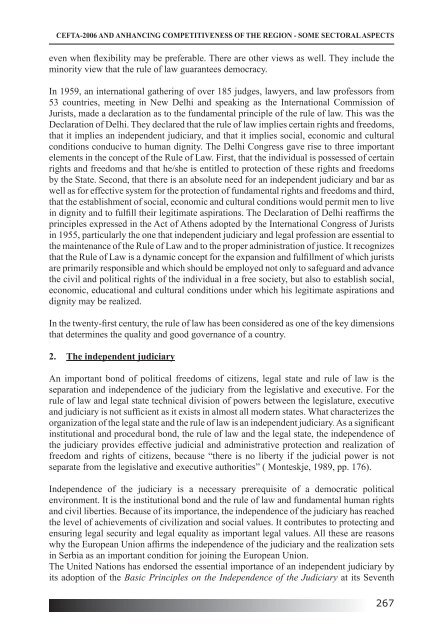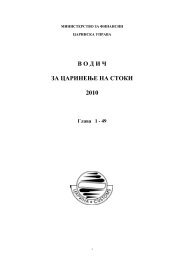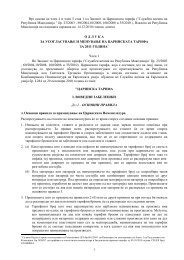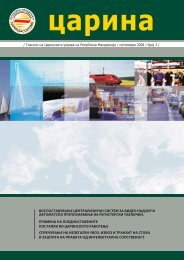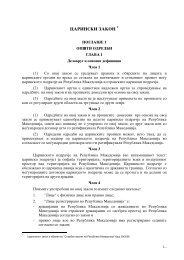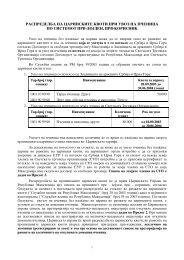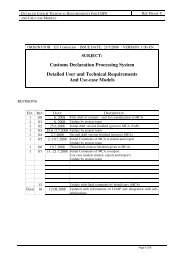REGIONAL COOPERATION AND ECONOMIC INTEGRATION
REGIONAL COOPERATION AND ECONOMIC INTEGRATION
REGIONAL COOPERATION AND ECONOMIC INTEGRATION
- No tags were found...
You also want an ePaper? Increase the reach of your titles
YUMPU automatically turns print PDFs into web optimized ePapers that Google loves.
CEFTA-2006 <strong>AND</strong> ANHANCING COMPETITIVENESS OF THE REGION - SOME SECTORAL ASPECTS<br />
even when flexibility may be preferable. There are other views as well. They include the<br />
minority view that the rule of law guarantees democracy.<br />
In 1959, an international gathering of over 185 judges, lawyers, and law professors from<br />
53 countries, meeting in New Delhi and speaking as the International Commission of<br />
Jurists, made a declaration as to the fundamental principle of the rule of law. This was the<br />
Declaration of Delhi. They declared that the rule of law implies certain rights and freedoms,<br />
that it implies an independent judiciary, and that it implies social, economic and cultural<br />
conditions conducive to human dignity. The Delhi Congress gave rise to three important<br />
elements in the concept of the Rule of Law. First, that the individual is possessed of certain<br />
rights and freedoms and that he/she is entitled to protection of these rights and freedoms<br />
by the State. Second, that there is an absolute need for an independent judiciary and bar as<br />
well as for effective system for the protection of fundamental rights and freedoms and third,<br />
that the establishment of social, economic and cultural conditions would permit men to live<br />
in dignity and to fulfill their legitimate aspirations. The Declaration of Delhi reaffirms the<br />
principles expressed in the Act of Athens adopted by the International Congress of Jurists<br />
in 1955, particularly the one that independent judiciary and legal profession are essential to<br />
the maintenance of the Rule of Law and to the proper administration of justice. It recognizes<br />
that the Rule of Law is a dynamic concept for the expansion and fulfillment of which jurists<br />
are primarily responsible and which should be employed not only to safeguard and advance<br />
the civil and political rights of the individual in a free society, but also to establish social,<br />
economic, educational and cultural conditions under which his legitimate aspirations and<br />
dignity may be realized.<br />
In the twenty-first century, the rule of law has been considered as one of the key dimensions<br />
that determines the quality and good governance of a country.<br />
2. The independent judiciary<br />
An important bond of political freedoms of citizens, legal state and rule of law is the<br />
separation and independence of the judiciary from the legislative and executive. For the<br />
rule of law and legal state technical division of powers between the legislature, executive<br />
and judiciary is not sufficient as it exists in almost all modern states. What characterizes the<br />
organization of the legal state and the rule of law is an independent judiciary. As a significant<br />
institutional and procedural bond, the rule of law and the legal state, the independence of<br />
the judiciary provides effective judicial and administrative protection and realization of<br />
freedom and rights of citizens, because “there is no liberty if the judicial power is not<br />
separate from the legislative and executive authorities” ( Monteskje, 1989, pp. 176).<br />
Independence of the judiciary is a necessary prerequisite of a democratic political<br />
environment. It is the institutional bond and the rule of law and fundamental human rights<br />
and civil liberties. Because of its importance, the independence of the judiciary has reached<br />
the level of achievements of civilization and social values. It contributes to protecting and<br />
ensuring legal security and legal equality as important legal values. All these are reasons<br />
why the European Union affirms the independence of the judiciary and the realization sets<br />
in Serbia as an important condition for joining the European Union.<br />
The United Nations has endorsed the essential importance of an independent judiciary by<br />
its adoption of the Basic Principles on the Independence of the Judiciary at its Seventh<br />
267


